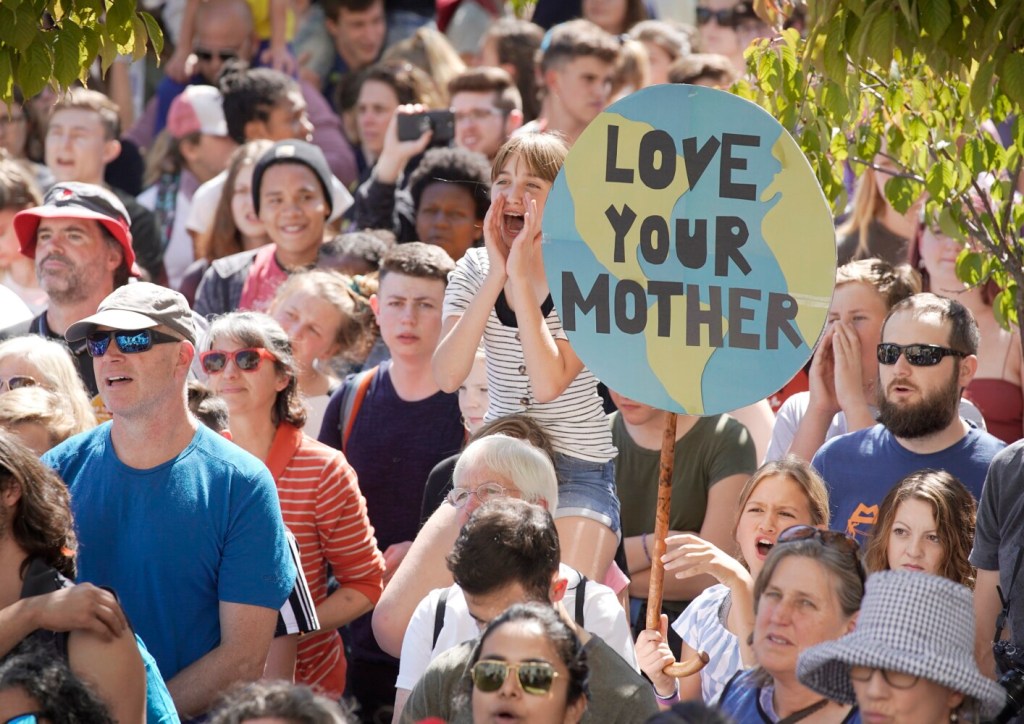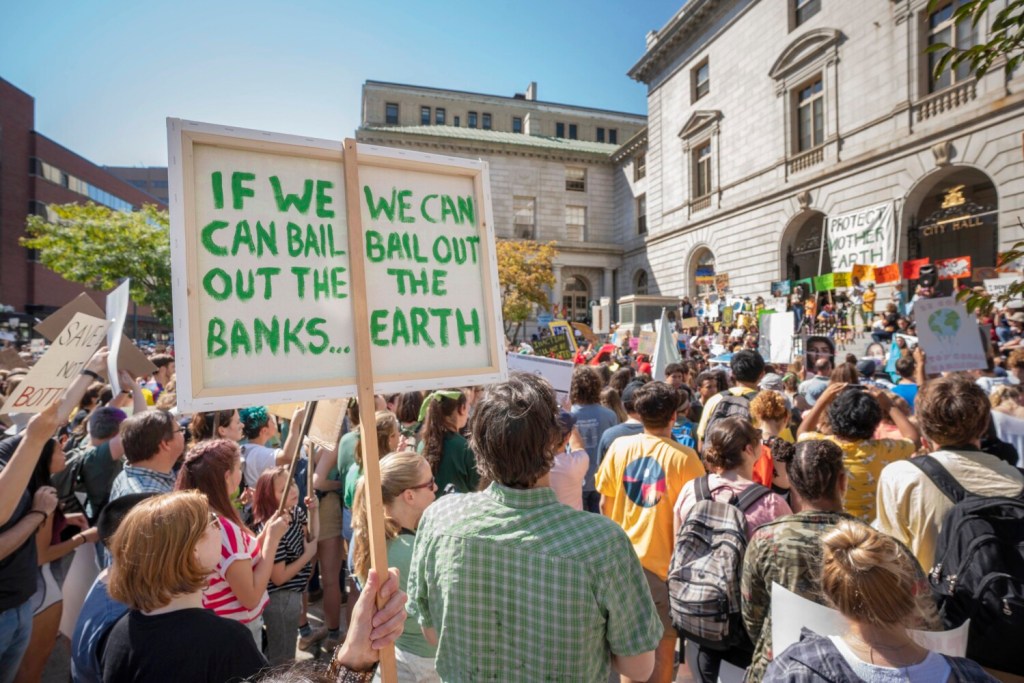Crowds of students carrying homemade signs and echoing climate-related chants gathered outside Portland City Hall on Friday to demand more aggressive action to address a “climate crisis” they view as jeopardizing their futures.

The youth-led “climate strike,” which drew at least 2,000 students and adults, was part of an international movement aimed at pressuring elected officials and world leaders to act more decisively on climate change.
“Climate change is the greatest crisis facing humanity, period. Period,” said Dianna Georges, a Bates College student, addressing the crowd that filled the square in front of City Hall and spilled onto Congress Street. “It will affect the lives of people from every part of the world, from every economic class and from every ethnic group.”
Other gatherings were also planned for Bangor, Bar Harbor, Farmington, Machias and Norway on Friday and were similar to student-led strikes held throughout the state in March. The international events were inspired, in large part, by a one-person school strike launched last year by a Swedish teenager, Greta Thunberg, who has become a global ambassador on what activists say has become a climate crisis.
In Portland, middle schoolers mingled with high school and college students in a sea of multicolored signs with such messages as “The sea is rising and so are we!” and “There is no wealth on a dead planet.” Participants chanted about climate justice, democracy and the need to move away from fossil fuels.
Students came from King and Lincoln middle schools, Baxter Academy, Fryeburg Academy, most Portland-area high schools as well as Colby, Bates and Bowdoin colleges. In some cases, students attended the rally with teachers as school-sanctioned events because it was connected to lessons, while others attended with parents or guardians.
“This is great energy. Please keep it up!” said Anna Siegel, a 13-year-old Yarmouth resident who helped orchestrate the rally and is Maine’s lead organizer for the group U.S. Youth Climate Strikes.
With the fired-up crowd enjoying some bright late-summer sun, speakers talked about the need to expand renewable energy in the state, to put citizens’ interests ahead of corporate profits and to trust scientists. But the key message was to demand more aggressive action to address a climate threat that they fear could severely disrupt their lives.
Students spoke about being part of a global movement fueled by anger and frustration at the political debates that continue to impede progress on addressing climate change. Earlier Friday, more than 100,000 reportedly rallied in Melbourne, Australia, and initial reports also put crowds in excess of 100,000 in Berlin and London.

People in the crowd at City Hall, many of them students, hold signs while listening to a speaker at Friday’s “climate strike.” Gregory Rec/Staff Photographer Buy this Photo
The rallies, which were timed to coincide with a United Nations climate summit in New York next week, drew massive media attention and praise from politicians such as former President Barack Obama.
“One challenge will define the future for today’s young generation more dramatically than any other: Climate change,” Obama tweeted. “The millions of young people worldwide who’ve organized and joined today’s #ClimateStrike demand action to protect our planet, and they deserve it.”
Siegel said those gathered in Portland were “echoing what is happening around the world on this day.”
“We are part of that force and that power, and we are using that power and energy to drive forward a sense of urgency,” Siegel said.
Speakers then read aloud resolutions to be presented to Portland and South Portland officials, urging them to officially recognize the “climate emergency.” The resolution also asks city leaders to “commit to take immediate actions to safeguard against the current, inevitable and potential consequences of the climate crisis” through specific policy goals, emergency funding and education.
Several elected officials from the two cities joined Siegel and the others on the steps of City Hall while the resolution was read to the crowd.

While climate strike organizer Anna Siegel, left, speaks to the crowd, two girls deliver a petition to Portland Mayor Ethan Strimling at City Hall on Friday. Over 2,000 people attended the rally, which called for officials in Portland and South Portland to declare a “climate emergency” and start creating policies to deal with climate change. Gregory Rec/Staff Photographer Buy this Photo
“We accept your demands and we will act on your demands,” Portland Mayor Ethan Strimling said, eliciting loud cheers from the crowd.
Last November’s elections produced a dramatic political shift in Maine on the issue of climate as Democratic Gov. Janet Mills replaced Republican Gov. Paul LePage, a vocal skeptic of human-caused climate change. Since taking office in January, Mills and her allies in the Legislature have ushered in ambitious new state goals for expanding renewable energy and reducing emissions of greenhouse gases.
On Monday, Mills will become Maine’s first sitting governor to address the United Nations when she gives a brief talk about the state’s climate agenda during the international body’s 2019 Climate Action Summit. Mills also will meet with European officials while in New York to discuss potential collaboration on climate issues and will participate in a panel discussion with other governors on states’ efforts to reduce greenhouse gas emissions.
Then on Thursday, a newly formed Maine Climate Council created by Mills and the Legislature will hold its first meeting to begin exploring strategies to meet those new renewable energy and greenhouse gas emissions goals.

Ruscirene Dinanga, a junior from Portland High School, chants with the crowd outside Portland City Hall on Friday to demand more aggressive action to combat climate change. Ben McCanna/Staff Photographer Buy this Photo
Maine’s environmental community and climate activists have welcomed that political shift. But achieving those statutory goals – including an 80 percent reduction in greenhouse gas emissions and obtaining 100 percent of electricity from renewable sources by 2050 – will take major policy changes and sustained political support.
Those gathered at Portland City Hall were clearly thinking long-term.
Simone Daranyi, 14, watched the speeches from the steps as she held a sign reading, “We strike because we care.”
“I’m not old enough to vote and when we all show up, hopefully this empowers the people who can vote and shows that we care,” said Daranyi, a freshman at Casco Bay High School.
“This has to happen,” said Frankie Sparrow, a 14-year-old freshman at Portland High School who watched the rally with Daranyi. “We have 10 years to turn this around. It’s so sad that officials aren’t doing anything, so it’s up to us. We can’t buy another planet.”
Send questions/comments to the editors.






Success. Please wait for the page to reload. If the page does not reload within 5 seconds, please refresh the page.
Enter your email and password to access comments.
Hi, to comment on stories you must . This profile is in addition to your subscription and website login.
Already have a commenting profile? .
Invalid username/password.
Please check your email to confirm and complete your registration.
Only subscribers are eligible to post comments. Please subscribe or login first for digital access. Here’s why.
Use the form below to reset your password. When you've submitted your account email, we will send an email with a reset code.